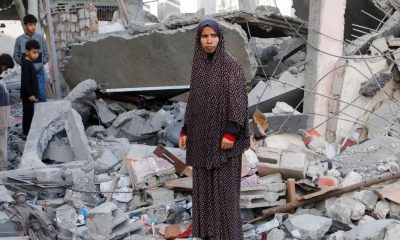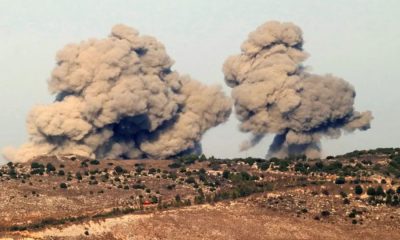International
World cannot afford Lebanon becoming another Gaza, says UN chief
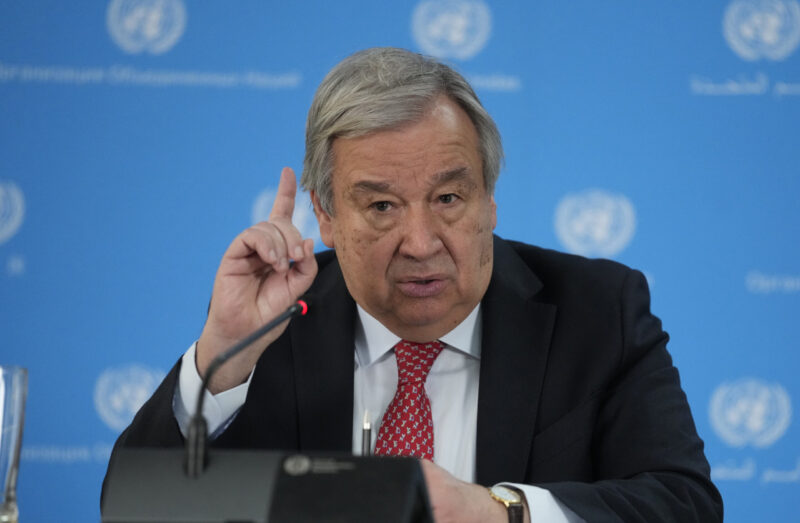
World cannot afford Lebanon becoming another Gaza, says UN chief
United Nations Secretary-General Antonio Guterres expressed increasing concern over the escalating war of words and deadly border clashes between Israel’s military and Lebanon’s Hezbollah fighters.
UN peacekeepers are working to calm the situation and prevent “miscalculation” after both sides heightened their rhetoric and raised the possibility of full-scale conflict, he said on Friday.
“One rash move – one miscalculation – could trigger a catastrophe that goes far beyond the border and, frankly, beyond imagination,” Guterres told reporters. “Let’s be clear: The people of the region and the people of the world cannot afford Lebanon to become another Gaza.”
A UN peacekeeping force UNIFIL, as well as unarmed technical observers known as UNTSO, have long been stationed in southern Lebanon to monitor hostilities along the demarcation line between Lebanon and Israel, known as the Blue Line.
“UN peacekeepers are on the ground working to de-escalate tensions and help prevent miscalculation,” Guterres said. “The world must say loudly and clearly: immediate de-escalation is not only possible – it is essential. There is no military solution.”
Hezbollah has fired rockets and drones into Israel since it launched the war on Gaza last October with the Israelis responding with deadly air strikes and heavy artillery fire. Hundreds have been killed and tens of thousands displaced along the border.
Israeli Prime Minister Benjamin Netanyahu and Defence Minister Yoav Gallant have previously pledged to “turn Beirut into Gaza”. This week, Hezbollah leader Hassan Nasrallah warned of “no restraint and no rules” if Israel launches a major attack on Lebanon.
‘Israelis will pay a huge price’
Analysts have said it remains unclear if both sides are upping their threats as deterrence, or if they are actually on the brink of all-out war. In terms of Israel’s war on Gaza, one expert said it is not accurate to compare Palestinian armed groups with Lebanese Hezbollah.
READ ALSO:
- 200 Chinese companies ready to invest in Nigeria – Minister
- British Airways flights disrupted after grounding aircraft at Lagos airport
- Cholera: Nigeria faces vaccine shortage as death toll hits 40
“Hezbollah is more trained, more organised with even more lethal weapons compared to Qassam Brigades, Hamas’s armed wing. And for this reason, I think the Israelis will pay a huge price for something they can avoid,” Hassan Barari, a professor of international affairs at Qatar University, told Al Jazeera.
Orna Mizrahi, a former official in Israel’s National Security Council, said none of the options are good for the country.
“But the big question is, how much can Israel suffer under this attack? I think most of the government doesn’t really want to get into a war, but it’s possible that we are getting there,” she said.
In Lebanon, Nasrallah’s comments left many bracing for a wider war. But some diplomats and analysts said his threats are an attempt to match the escalating rhetoric from Israel.
“To me, now this is part of a deterrent strategy,” said Hubert Faustmann, professor of history and international relations at the University of Nicosia.
“There is a high danger of Israel escalating the confrontation with Hezbollah and an all-out, full-scale war, which I don’t think Hezbollah wants,” Faustmann added, saying Hezbollah is demonstrating what it “could do” if that were to happen.
Hezbollah has indicated it is not seeking a wider conflict, even as it has steadily drawn on more potent weaponry.
While Israel has the most powerful army in the Middle East, Hezbollah has thousands of fighters, many with experience in the Syrian civil war, and an arsenal of tens of thousands of missiles capable of hitting cities all over Israel.
It also has a large fleet of drones, one of which appears to have carried out an extended flight over the port city of Haifa this week, underlining the potential threat to key economic infrastructure including power systems.
‘Tall order for Israeli air defences’
There are fears a wider escalation could overwhelm Israel’s Iron Dome missile defence system, which has so far intercepted most of the hundreds of missiles fired by Hezbollah.
READ ALSO:
- Kenya investigates police conduct in protests over new tax plan
- Peter Obi didn’t create Obidient Movement, says Aisha Yesufu
- Falana, other lawyers fault court ruling on Sanusi, Bayero dispute
“My sense is that Hezbollah feels it has some leverage over the Israelis, because an escalating war – as much damage as it might do in Lebanon and Syria – would create terror in Israel,” said Seth G Jones, an analyst at the Centre for Strategic and International Studies in Washington, DC.
“It would be a tall order for Israeli air defences to confront the widespread rocket arsenal coming from the north. It would be a huge problem.”
Israel has had bruising experiences in Lebanon in the past. After its forces invaded in 1982, they were stuck holding a buffer zone for nearly two decades after a war that saw the birth of Hezbollah. There was a second 34-day war in 2006 that bloodied both sides.
But the political pressure on Netanyahu has swelled with no indication of when life will return to normal more than eight months after the beginning of the conflict.
Dozens of Israeli towns are deserted with about 60,000 people evacuated to temporary accommodation, leaving empty streets with the occasional building scarred by rocket fire. Some 90,000 have also fled southern Lebanon.
Sarit Zehavi – a former Israeli military intelligence official who runs a think tank that specialises on Israel’s northern border – said after the trauma Israel suffered on October 7, few of those who left their homes would be ready to return while Hezbollah remained entrenched along the border.
“For 17 years, we did nothing against the threat and now dealing with it will cost a very high price,” Zehavi said.
World cannot afford Lebanon becoming another Gaza, says UN chief
SOURCE: AL JAZEERA AND NEWS AGENCIES
International
Trump slams Nigeria with high tariff in shocking trade crackdown

Trump slams Nigeria with high tariff in shocking trade crackdown
President Donald Trump has ignited a global trade firestorm, imposing sweeping tariffs on imports into the United States, with Nigeria among the hardest hit.
Declaring a “national economic emergency,” Trump announced an across-the-board 10% tariff on all foreign goods, while 60 countries deemed “the worst offenders” by his administration will face even steeper levies.
Nigeria has been slapped with a 27% tariff, while South Africa faces a staggering 60% levy on exports to the U.S. The measures, set to take effect on April 5, mark a dramatic shift in global trade dynamics.
Speaking from the White House Rose Garden, Trump declared “Liberation Day” for American industry, calling the moment the beginning of America’s “economic rebirth.”
“Today marks the day America was made wealthy again,” he proclaimed to thunderous applause. “For too long, we have been taken advantage of. Now, it’s our turn to prosper.”
READ ALSO:
- Barcelona beat Atletico to set up cup final against Real Madrid
- NNPCL hikes petrol pump price to N950/litre
- Liverpool leap closer to title with narrow Everton win
Trump vowed to bring jobs and manufacturing “roaring back” to the U.S., promising to “pry open foreign markets” while ensuring foreign goods no longer flood American stores unchecked.
As part of his sweeping measures, Trump announced a 25% tariff on all foreign-made vehicles, effective midnight, targeting countries like Japan, South Korea, and Germany. He lambasted nations that limit U.S. exports while dominating the American market.
“We take their cars, they refuse ours. That ends today,” he declared, citing statistics that over 80% of South Korean cars are sold domestically, while U.S. automakers struggle to penetrate foreign markets.
Trump slams Nigeria with high tariff in shocking trade crackdown
International
Deadly strikes in Gaza as Netanyahu says Israel will seize new military corridor
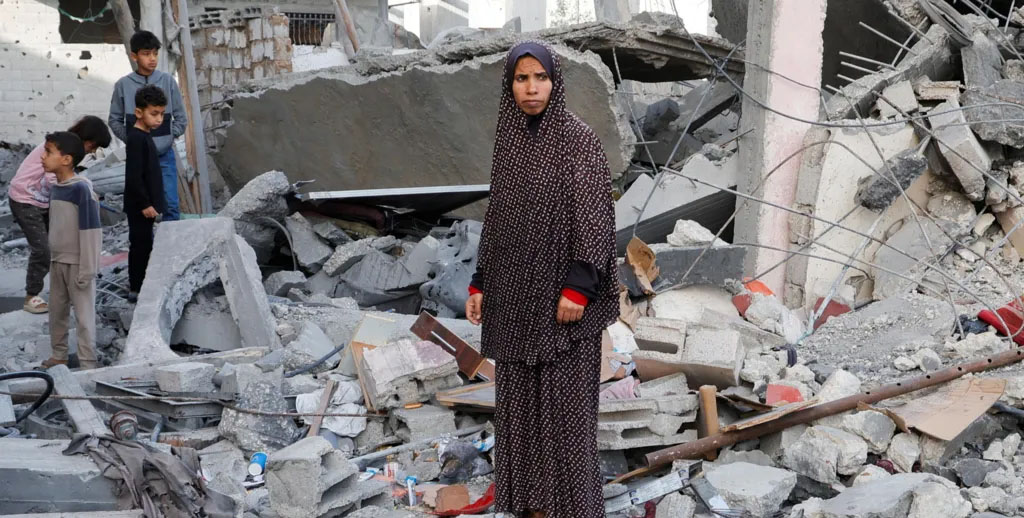
Deadly strikes in Gaza as Netanyahu says Israel will seize new military corridor
Israel’s prime minister has said it is expanding its Gaza offensive and establishing a new military corridor to put pressure on Hamas, as deadly Israeli strikes were reported across the Palestinian territory.
Benjamin Netanyahu said Israeli forces were “seizing the Morag Corridor” – a reference to a former Jewish settlement once located between the southern cities of Rafah and Khan Younis.
Earlier, his defence minister said troops would seize large areas for “security zones”.
Meanwhile, 19 Palestinians, including nine children, were killed in an air strike on a UN clinic-turned-shelter in the northern town of Jabalia, a local hospital said. Israel’s military said it targeted “Hamas terrorists”.
Strikes across Gaza on Tuesday night killed at least 20 people, according to hospitals.
The Hamas-run Civil Defence agency said its first responders recovered the bodies of 12 people, including women and children, from a home in Khan Younis.
Rida al-Jabbour said a neighbour and her three-month-old baby were among the dead.
“From the moment the strike occurred we have not been able to sit or sleep or anything,” she told Reuters news agency.
The Israeli military said it was looking into the reports.
There were also reports of extensive bombardment along the border with Egypt overnight.
READ ALSO:
- Wike congratulates Okpebholo on tribunal victory
- FG orders immediate reopening of independence bridge in Lagos to ease traffic
- Protect vulnerable Nigerians, IMF tells Tinubu
The Civil Defence said the strike in Jabalia on Wednesday morning hit two rooms in a clinic run by the UN agency for Palestinian refugees (Unrwa) which was being used as a shelter.
Video verified by the BBC showed dozens of people and ambulances rushing to the building. Smoke was seen billowing from a wing where two floors appeared to have collapsed.
Unrwa’s commissioner-general, Philippe Lazzarini, wrote on X that the building was previously a health centre that it had been heavily damaged earlier in the war.
“Initial reports indicate the facility was sheltering over 700 people when it was hit,” he said, adding that a two-week-old baby was reportedly among the dead. “Displaced families stayed at the shelter after it was hit because they have nowhere else to go.”
Lazzarini said too many Unrwa premises had reportedly been used for fighting purposes by Palestinian armed groups or Israeli forces, and warned that the “total disregard of UN staff, premises or operations is a profound defiance of international law”.
The Israeli military said that it targeted Hamas operatives who were “hiding inside a command and control centre that was being used for co-ordinating terrorist activity and served as a central meeting point”.
It said “numerous steps were taken to mitigate the risk of harming civilians, including the use of aerial surveillance and additional intelligence”.
Hamas denied that its fighters had been using the building.
Fadel Ashour said he had been at the al-Ahli hospital in Gaza City when some of those wounded by the Jabalia strike were brought there for treatment.
“This shelter is home to many people, and every time the Israeli army bombs it, everyone inside is harmed,” he told BBC Arabic’s Gaza Lifeline programme.
READ ALSO:
- Ex-NYSC DG Tsiga regains freedom after 56 days in captivity
- Notorious bandit leader Bello Turji goes berserk, kills 12 to celebrates Eid
- Uromi killings: Deputy Senate President donates N16m to victims’ families
On Wednesday evening, Israel’s prime minister said in a video statement that the IDF had “switched gears” overnight and was “seizing territory, striking the terrorists and destroying the infrastructure”.
“We are also doing something else: We are seizing the Morag Corridor. This will be the second Philadelphi, an additional Philadelphi Corridor,” Netanyahu added, referring to a strip of territory running along the Egyptian border that the Israeli military seized last May.
Dividing Gaza, he said, would increase pressure on Hamas “step by step” and force the group to hand over the 59 hostages it is still holding in Gaza, 24 of whom are believed to be alive.
“As long as they do not give them to us, the pressure will increase until they do.”
Israeli Defence Minister Israel Katz had announced earlier that the military would be expanding its offensive to clear and “seize large areas that will be added to the security zones of the State of Israel”, without saying where they would be. He added that it would require a “large-scale” evacuation of Palestinians.
Katz also urged Gazans to act to remove Hamas and free remaining Israeli hostages, without suggesting how they should do so.
The Hostages and Missing Families Forum in Israel, which represents many hostages’ relatives, said they were “horrified to wake up” to the news of the expanded military operation. It urged the Israeli government to prioritise securing the release of all the hostages.
This week, Israel’s military has ordered an estimated 140,000 people in Rafah to leave their homes and issued new evacuation orders for parts of northern Gaza.
Israel has already significantly expanded a buffer zone around the edge of Gaza over the course of the war, and seized control of a corridor of land cutting through its centre, known as the Netzarim Corridor.
Israel launched its renewed Gaza offensive on 18 March, blaming Hamas for rejecting a new US proposal to extend the ceasefire and free the remaining hostages. Hamas, in turn, accused Israel of violating the original deal they had agreed to in January.
The humanitarian situation across Gaza has dramatically worsened in recent weeks, with Israel refusing to allow aid into the Gaza Strip since 2 March – the longest aid blockage since the war began.
Last month, the UN announced it was reducing its operations in Gaza, one day after eight Palestinian medics, six Civil Defence first responders and a UN staff member were killed by Israeli forces in southern Gaza.
The Israeli military launched a campaign to destroy Hamas in response to an unprecedented cross-border attack on 7 October 2023, in which about 1,200 people were killed and 251 were taken hostage.
At least 50,423 people have been killed in Gaza during the ensuing war, including 1,066 over the past two weeks, according to the Hamas-run health ministry.
Additional reporting by Rachel Hagan in London
Deadly strikes in Gaza as Netanyahu says Israel will seize new military corridor
BBC
International
Democrats drag Trump to court over election overhaul order

Democrats drag Trump to court over election overhaul order
The Democratic Party has sued the Trump administration over an attempt to impose sweeping changes on the election systems, including requiring citizenship proof to register to vote and limiting mail-in ballot counting.
In a lawsuit filed Monday, the Democratic Party asked a federal court to block the executive order, which prevents states from counting mail-in ballots that arrive after election day. The president’s directive also requires proof of citizenship to be presented — through documents such as a passport — when registering to vote.
“The President does not get to dictate the rules of our elections,” said the lawsuit filed in Washington by the Democratic National Committee, Senate Minority Leader Chuck Schumer, House Minority Leader Hakeem Jeffries and others.
“The Executive Order seeks to impose radical changes on how Americans register to vote, cast a ballot, and participate in our democracy—all of which threaten to disenfranchise lawful voters and none of which is legal,” it added.
After signing the March 25 order, called “Preserving and Protecting the Integrity of American Elections”, US President Donald Trump described it as “the farthest-reaching executive action taken” to secure US elections.
READ ALSO:
- If anything happens to me, hold Akpabio, others responsible – Natasha
- Breaking: ‘Cancel your homecoming’ — Police tell Senator Natasha
- Lightning strike kills herder, 12 cows in Kaduna
Trump, who does not acknowledge his defeat in the 2020 presidential election, has long questioned the integrity of the US electoral system. He has repeatedly and baselessly amplified conspiracy theories about massive election fraud in the United States, particularly involving absentee voting.
Legal scholars swiftly denounced Trump’s election order as an abuse of presidential power that could prevent millions of eligible voters from casting ballots.
Advocacy groups led by the Campaign Legal Center and State Democracy Defenders Fund filed a separate lawsuit on Monday against the same executive order.
“The president’s executive order is an unlawful action that threatens to uproot our tried-and-tested election systems and silence potentially millions of Americans,” Danielle Lang of the Campaign Legal Center said in a statement.
“It is simply not within the president’s authority to set election rules by executive decree, especially when they would restrict access to voting in this way.”
Democrats drag Trump to court over election overhaul order
AFP
-

 metro2 days ago
metro2 days agoBREAKING: Senator Natasha defies restrictions, arrives homecoming rally by helicopter [VIDEO]
-
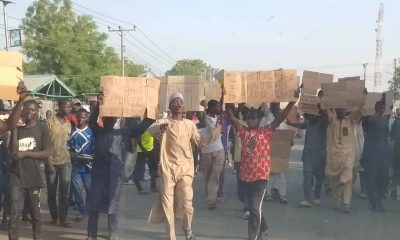
 metro2 days ago
metro2 days agoUromi: Edo residents flee towns over likely reprisal attack, arrest
-

 metro2 days ago
metro2 days agoBreaking: ‘Cancel your homecoming’ — Police tell Senator Natasha
-

 metro3 days ago
metro3 days agoHow they murdered my Kano-bound passengers in Edo
-

 metro3 days ago
metro3 days ago‘I was offered N5bn bribe to impeach Fubara’
-

 metro1 day ago
metro1 day agoBreaking: Tinubu sacks Kyari, appoints Ojulari as new NNPCL GCEO
-

 metro2 days ago
metro2 days agoAmosun, Adeola engage in verbal attack over project diversion allegation
-

 metro3 days ago
metro3 days agoKano Gov Yusuf, Sanusi linked to Eid killings

